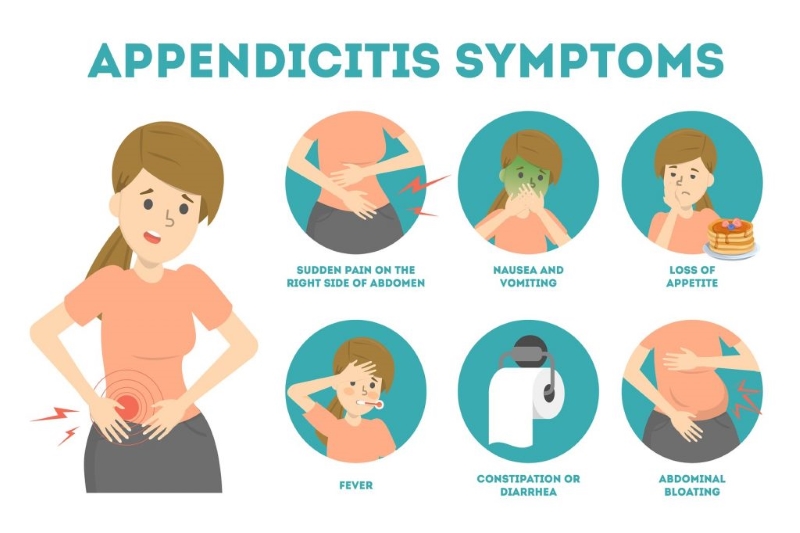
Symptoms of appendicitis: when to seek Emergency Care
The appendix is a pouch-like organ that sits in the lower right side of your belly. Appendicitis describes an inflamed or infected appendix
However, appendicitis is a medical emergency and can be life-threatening if an inflamed appendix ruptures.
What is Appendicitis?
As the name suggests, appendicitis is the painful swelling of the appendix, which is a small thin pouch about 2-4 inches long.
The appendix is attached to the large intestine.
While nobody knows what its function is, we do know that removing it is not harmful. (Mayo Clinic 2019)
Fast facts on appendicitis:
- Early symptoms include pain near the belly button that may shift toward the lower right-hand side of the abdomen.
- If treatment for gas does not solve the problem, prompt medical attention should be sought.
- Many people with suspected appendicitis will go directly to the emergency department.
- Early treatment is usually successful, but untreated appendicitis can lead to fatal complications. (Medical News Today 2017)
What Causes Appendicitis?
The appendix connects to your large intestine.
Appendicitis occurs when something — mucus, foreign object, or most often stool (waste) — blocks the opening between the appendix and the large intestine.
The blockage causes irritation, inflammation, and possibly an infection.
Recognizing Appendicitis Symptoms
The main symptom of appendicitis is abdominal pain.
You may feel discomfort in the entire stomach area.
However, there could be additional symptoms such as:
- Abdominal pain that gets worse when you cough or walk
- Abdominal swelling
- Indigestion
- Nausea and vomiting soon after abdominal pain begins
- Loss of appetite
- Fever
- Inability to pass gas
- Constipation or diarrhea (Healthline 2016)
Symptoms of appendicitis come on suddenly and intensify quickly
Pain may worsen when you move, take a deep breath, cough, or sneeze.
Acute appendicitis is a severe and sudden condition, with symptoms usually developing over one or two days.
If you suspect your abdominal pain is due to appendicitis, you need to seek immediate medical attention.
When left untreated, you run the risk of having your appendix burst a condition known as peritonitis.
Peritonitis is a severe life-threatening condition caused by bacteria from your ruptured appendix spilling into your abdominal cavity.
How is Appendicitis Diagnosed
Diagnosing appendicitis can be tricky.
Symptoms are often unclear or similar to those of other illnesses, including gallbladder problems, bladder or urinary tract infection, kidney stones, intestinal infection, and ovary problems.
Although these tests can help diagnose appendicitis:
- Abdominal Exam: During the examination, they will check for tenderness in the lower right part of your abdomen, as well as for any swelling or rigidity
- Urine Test: This is done to rule out the possibility of your pain is caused by a urinary tract infection or kidney stones
- Blood Test: A complete blood count test will tell our doctors if you have an infection
- Abdominal Imaging Tests: These tests will help find any inflammation of your appendix. Our doctors may order one or more the following exams:
- Abdominal Ultrasound or X-Ray or CT Scan (WebMD)
When to Seek Medical Help
Appendicitis can be life-threatening, and it requires immediate medical care.
It is likely to worsen the longer it is left untreated. Initial symptoms may feel like gas.
Sudden severe abdominal pain is usually a red flag so if you suddenly develop any of the symptoms mentioned above, you should immediately head to the nearest Emergency Room.
Treating appendicitis as soon as symptoms appear will prevent it from worsening and causing further complications.
References
Khatri, Minesh. “Appendicitis: Early Symptoms, Causes, Pain Location, Surgery, Recovery.” WebMD, WebMD, 28 Sept. 2019, www.webmd.com/digestive-disorders/digestive-diseases-appendicitis
“Appendicitis: Early Symptoms and Warning Signs.” Medical News Today, MediLexicon International, www.medicalnewstoday.com/articles/312123
Nall, Ann Pietrangelo, and Rachel. “Emergency Signs and Symptoms of Appendicitis.” Healthline, Healthline Media, 11 May 2019, www.healthline.com/health/digestive-health/appendicitis-emergency-symptoms
“Appendicitis.” Mayo Clinic, Mayo Foundation for Medical Education and Research, 24 May 2019, www.mayoclinic.org/diseases-conditions/appendicitis/symptoms-causes/syc-20369543Swain-Wilson, Savanna. “11 Signs You May Have Appendicitis.” Insider, Insider, 22 Feb. 2019, www.insider.com/signs-of-appendicitis-2019-2
Read Also
Emergency Live Even More…Live: Download The New Free App Of Your Newspaper For IOS And Android
Appendicitis: Causes, Symptoms And Treatment
Appendicitis: Symptoms And Causes
Biliary Colic: How To Recognise And Treat It
What’s Causing Your Abdominal Pain And How To Treat It
Appendicitis: What Causes It And How To Deal With It
Bowel Disorders, Ultrasound Of The Intestinal Loops For Diagnosis
Peptic Ulcer, Often Caused By Helicobacter Pylori
Peptic Ulcer: The Differences Between Gastric Ulcer And Duodenal Ulcer
Wales’ Bowel Surgery Death Rate ‘Higher Than Expected’
Irritable Bowel Syndrome (IBS): A Benign Condition To Keep Under Control
Ulcerative Colitis: Is There A Cure?
Colitis And Irritable Bowel Syndrome: What Is The Difference And How To Distinguish Between Them?
Irritable Bowel Syndrome: The Symptoms It Can Manifest Itself With
Can Stress Cause A Peptic Ulcer?
What Are The Differences Between Diverticulitis And Diverticulosis?
Irritable Bowel Syndrome (IBS): A Benign Condition To Keep Under Control
Gastroesophageal Reflux: Causes, Symptoms, Tests For Diagnosis And Treatment
Cholangitis: Symptoms, Causes And Treatment
What Is Cholecystitis? Symptoms, Diagnosis And Treatment
Sclerosing Cholangitis: Symptoms, Diagnosis And Treatment
The Dangers Of Raw Or Undercooked Fish: Opisthoriasis
First Time Ever: Successful Operation With A Single-Use Endoscope On Immunodepressed Child


